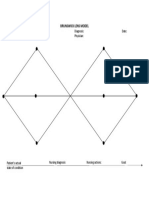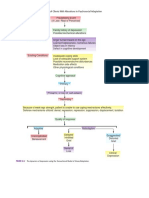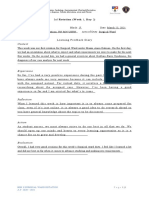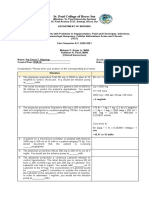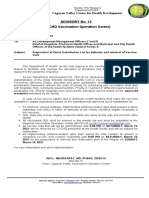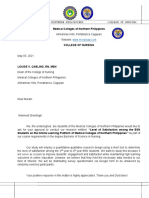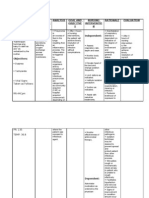0 ratings0% found this document useful (0 votes)
96 viewsNPI Process Recording
NPI Process Recording
Uploaded by
Christine ElbanbuenaThis document summarizes a nurse-patient interaction and the types of coping mechanisms. The nurse, Sarah, introduces herself to the confused patient, Mr. Santos, who is defensive and displaced. She informs him that he attempted suicide and is now in the mental health facility. Mr. Santos responds with silence, slumped shoulders, and staring at the floor. The interaction outlines adaptive, palliative, maladaptive, dysfunctional, and dysfunctional coping types and provides examples of each.
Copyright:
© All Rights Reserved
Available Formats
Download as PDF, TXT or read online from Scribd
NPI Process Recording
NPI Process Recording
Uploaded by
Christine Elbanbuena0 ratings0% found this document useful (0 votes)
96 views7 pagesThis document summarizes a nurse-patient interaction and the types of coping mechanisms. The nurse, Sarah, introduces herself to the confused patient, Mr. Santos, who is defensive and displaced. She informs him that he attempted suicide and is now in the mental health facility. Mr. Santos responds with silence, slumped shoulders, and staring at the floor. The interaction outlines adaptive, palliative, maladaptive, dysfunctional, and dysfunctional coping types and provides examples of each.
Copyright
© © All Rights Reserved
Available Formats
PDF, TXT or read online from Scribd
Share this document
Did you find this document useful?
Is this content inappropriate?
This document summarizes a nurse-patient interaction and the types of coping mechanisms. The nurse, Sarah, introduces herself to the confused patient, Mr. Santos, who is defensive and displaced. She informs him that he attempted suicide and is now in the mental health facility. Mr. Santos responds with silence, slumped shoulders, and staring at the floor. The interaction outlines adaptive, palliative, maladaptive, dysfunctional, and dysfunctional coping types and provides examples of each.
Copyright:
© All Rights Reserved
Available Formats
Download as PDF, TXT or read online from Scribd
Download as pdf or txt
0 ratings0% found this document useful (0 votes)
96 views7 pagesNPI Process Recording
NPI Process Recording
Uploaded by
Christine ElbanbuenaThis document summarizes a nurse-patient interaction and the types of coping mechanisms. The nurse, Sarah, introduces herself to the confused patient, Mr. Santos, who is defensive and displaced. She informs him that he attempted suicide and is now in the mental health facility. Mr. Santos responds with silence, slumped shoulders, and staring at the floor. The interaction outlines adaptive, palliative, maladaptive, dysfunctional, and dysfunctional coping types and provides examples of each.
Copyright:
© All Rights Reserved
Available Formats
Download as PDF, TXT or read online from Scribd
Download as pdf or txt
You are on page 1of 7
Nurse-Patient Interaction
Nurse/Student Patient Inference
Verbal and Non- Verbal and Non-Verbal
Verbal Client’s Defense
Mechanism
Therapeutic Communication Critique/Analysis
“Good morning Mr. “Who are you and where Giving recognition- I was feeling nervous. He
Santos”” the devil am I?” Gazes Acknowledging a client by attempted suicide and I don’t
around with a confused name can enhance self-esteem know if I could help him.
look on his face. and communicates that the Initially I was feeling
Defense: Displacement client is viewed as an individual somewhat overwhelmed of
Coping: Maladaptive by the nurse. his history.
“I am Sarah. I am a “What am I doing Giving Information- I felt a bit
student Nurse from here? How did I get Informing the client intimidated who is
Colegio San Agustin- here?” of facts needed to raised his voice.
Bacolod and you are Spoken in a loud , make decisions or
at the National demanding voice. come to a realistic
Center for Mental Defense: conclusions.
Health. I would like Displacement/ Offering Self-
to spend some time Denial Making oneself
with you today.” Coping: Maladaptive available to the
client
“ You were brought “ Oh…Yeah.” Silence Giving Information- I was uncomfortable
in by your wife last for 2 minutes. Giving needed facts with silence, but
night after Shoulders slumped. so that the client since I didn’t have
swallowing a bottle Mr. Santos stares at can orient himself anything useful to
of aspirin. You had the floor and drops and better evaluate say so I stayed with
to stay to have your his head. his situation. him in silence for 2
stomach pumped” Coping: Palliative minutes.
Types of
Coping
Type of Coping Description Common use Patient Example
Adaptive Solves the problem Anxiety about an Anxiety about the discharge from the
that is causing the upcoming hospital is handled by writing down
anxiety, so that examination is medications, dates and times of
anxiety is reduced by studying follow-up appointments, and self-
decreased. effectively and help meetings in calendar. The
The patient is passing the patient keeps appointment and
objective, rational examination with a attends two-self meetings, takes
and productive grade of 95%. medication and returns to work.
Type of Coping Description Common use Patient Example
Palliative Temporarily decreases Anxiety about the Anxiety about discharge
the anxiety but does not examination is is handled by watching
solve the problem, so temporarily reduced by television in the evening.
the anxiety eventually jogging for half an hour. In the morning, the
returns. Temporary relief Effective studying is then patient takes the
allows the patient to possible and a grade of discharge instructions
return to problem 95% is still achievable. written by the nurse and
solving. puts them in his pocket.
He keeps his first follow
up appointments and
attend self-help meeting.
He takes his medications
and able to return to
work.
Type of Coping Description Common use Patient Example
Maladaptive Unsuccessful attempts to Anxiety about Anxiety about the
decrease the anxiety examination is first discharge is handle by
without attempting to ignored by going to a saying that he
solve the problem. The movie and then handled remembers all the
anxiety remains by frantically cramming appointments and
for a few hours. A passing meetings, and that
grade of 75% is obtained. directions for the
medication will be on the
bottles . He misses the
meetings and his
appointment, but makes
another appointment
when called. He takes his
am and pm medication
but forgets the noon
dose all week. He goes to
work but complains of
being anxious all day
Type of Coping Description Common use Patient Example
Dysfunctional Is not successful in Anxiety about the Anxiety about the
reducing anxiety or examination is first discharge is handled by
solving the problem. ignored by going out ignoring the nurse and
Even minimal drinking with friends starting an argument
functioning becomes and then escaped by with another patient.
difficult, and new passing out for the When asked to take
problems begin to night. A grade of 68% time out, the patient
develop. results, and the course leaves the hospital
has to be repeated. without being
discharged; his bill is
not paid by insurance.
He does not get his
prescriptions and is
brought back to the
hospital in 3 weeks.
You might also like
- Adam Lyons The Obsession Formula PDFDocument61 pagesAdam Lyons The Obsession Formula PDFSDSamson63% (8)
- Patophy of PudDocument4 pagesPatophy of PudClarence BravioNo ratings yet
- Duran, Fatima Medriza B. - Partial Npi For RleDocument11 pagesDuran, Fatima Medriza B. - Partial Npi For Rlenot your medz duranNo ratings yet
- 1.MOD On GERON (1) CommunicationDocument19 pages1.MOD On GERON (1) CommunicationPatricia VasquezNo ratings yet
- Color Psychology PDFDocument16 pagesColor Psychology PDFDaniel Acosta100% (2)
- Brunswick Lens Model PDFDocument1 pageBrunswick Lens Model PDFDonna DuhigNo ratings yet
- Febrile Seizures NCPDocument9 pagesFebrile Seizures NCPNurul IrhamnaNo ratings yet
- Nursing Care Plan (NCP) For SchizophreniformDocument8 pagesNursing Care Plan (NCP) For SchizophreniformRisa Sol AriasNo ratings yet
- New HTP Neuro Acute PainDocument5 pagesNew HTP Neuro Acute PainddsadNo ratings yet
- Nurse Patient Interpretation AnalysisDocument2 pagesNurse Patient Interpretation AnalysisTikTok TrendzNo ratings yet
- Drug Study and NCP (Craniotomy)Document2 pagesDrug Study and NCP (Craniotomy)Deinielle Magdangal Romero100% (1)
- Case Study FormatDocument5 pagesCase Study FormatEden OlasabNo ratings yet
- Endometrial Adenocarcinoma A Tahbso CaseDocument78 pagesEndometrial Adenocarcinoma A Tahbso CaseJohn Mark Obrero100% (1)
- Home Visit Plan: Family Members Age Educational Attainment OccupationDocument2 pagesHome Visit Plan: Family Members Age Educational Attainment OccupationFahim AhmedNo ratings yet
- Worksheet On Moral Deliberation - FinalbDocument4 pagesWorksheet On Moral Deliberation - FinalbEmmanuel ApuliNo ratings yet
- Licensing Board: Nursing LawDocument19 pagesLicensing Board: Nursing LawBiway RegalaNo ratings yet
- Daily Anecdotal ReportDocument5 pagesDaily Anecdotal ReportKarl Angelo MontanoNo ratings yet
- Ortho NCPDocument3 pagesOrtho NCPMarshin Thea CelociaNo ratings yet
- FNCPDocument7 pagesFNCPMaria Ivy Rochelle TanNo ratings yet
- Aiza NCPDocument6 pagesAiza NCPponponolmedoNo ratings yet
- Nursing Care Plans ...Document16 pagesNursing Care Plans ...Santos Kyla Patricia T.No ratings yet
- Problem IdentificationDocument3 pagesProblem IdentificationkgxviiNo ratings yet
- NCM 118 Medsurg EndtermDocument25 pagesNCM 118 Medsurg EndtermJmarie Brillantes PopiocoNo ratings yet
- 10 Pathophysiology DiagramDocument3 pages10 Pathophysiology DiagramDizerine Mirafuentes RolidaNo ratings yet
- University of The East Ramon Magsaysay Memorial Medical Center, IncDocument5 pagesUniversity of The East Ramon Magsaysay Memorial Medical Center, IncSarah CruzNo ratings yet
- Pathophysiology On Fracture of Left Femoral Head: Precipitating Factor Predisposing FactorDocument2 pagesPathophysiology On Fracture of Left Femoral Head: Precipitating Factor Predisposing FactorEsther Mendez CatubigNo ratings yet
- Module 2 - Case 1Document9 pagesModule 2 - Case 1Joselyn M. LachicaNo ratings yet
- 468 U N I T 4: Nursing Care of Clients With Alterations in Psychosocial AdaptationDocument1 page468 U N I T 4: Nursing Care of Clients With Alterations in Psychosocial AdaptationMercy JacobNo ratings yet
- NCP Impaired Physical MobilityDocument1 pageNCP Impaired Physical MobilityLorraine Punla PanganNo ratings yet
- Bachelor of Science in Nursing: Intensive Nursing Practicum: Rle LCP Module Rle LCP Unit WeekDocument8 pagesBachelor of Science in Nursing: Intensive Nursing Practicum: Rle LCP Module Rle LCP Unit WeekMichelle Gliselle Guinto MallareNo ratings yet
- Student Nurses' Community Nursing Care PlanDocument3 pagesStudent Nurses' Community Nursing Care PlanMussaib MushtaqNo ratings yet
- Evidence Based ActivityDocument3 pagesEvidence Based ActivityRegine CuntapayNo ratings yet
- NCP Case PresDocument5 pagesNCP Case Pressyd19No ratings yet
- NCPDocument6 pagesNCPSarah Younes AtawnehNo ratings yet
- Context: NCM 116 RleDocument1 pageContext: NCM 116 RleTaraKyleUyNo ratings yet
- FNCP ProperDocument3 pagesFNCP ProperSoniaMarieBalanayNo ratings yet
- Learning FeedbackDocument2 pagesLearning FeedbackKeneth Dave AglibutNo ratings yet
- Goso Opd Day 2Document1 pageGoso Opd Day 2Johanisa SultanNo ratings yet
- ncp-Nursing-Diagnosis - Ineffective - 510.htmlDocument2 pagesncp-Nursing-Diagnosis - Ineffective - 510.htmlrayearth_109368No ratings yet
- Drug Study (Burn Injury) ManuscriptDocument4 pagesDrug Study (Burn Injury) ManuscriptEricka VillanuevaNo ratings yet
- NCM 112 Computation 2021Document3 pagesNCM 112 Computation 2021Marie Kelsey Acena Macaraig100% (1)
- Assessment Nursing Diagnosis Planning Intervention Rationale EvaluationDocument7 pagesAssessment Nursing Diagnosis Planning Intervention Rationale EvaluationMaria Fatima MagsinoNo ratings yet
- Screen Time Literature ReviewDocument5 pagesScreen Time Literature Reviewapi-548942867No ratings yet
- Pathophysiology Appendicitis: Predisposing Factors Precipitating FactorsDocument2 pagesPathophysiology Appendicitis: Predisposing Factors Precipitating FactorsAce FabrigasNo ratings yet
- Age NCPDocument3 pagesAge NCPMartin Allen ClaudioNo ratings yet
- Assessment Nursing Diagnosis Scientific Rationale Planning Intervention Rationale EvaluationDocument2 pagesAssessment Nursing Diagnosis Scientific Rationale Planning Intervention Rationale Evaluationclydell joyce masiarNo ratings yet
- Initial Nurse - Docx NPI NPIDocument22 pagesInitial Nurse - Docx NPI NPIIyanna BaylonNo ratings yet
- NCP, PL, DPDocument6 pagesNCP, PL, DPJazel Algara JompillaNo ratings yet
- Assessment Diagnosis Outcomes Interventions Rationale Expected OutcomeDocument1 pageAssessment Diagnosis Outcomes Interventions Rationale Expected OutcomeMatelyn OargaNo ratings yet
- NCP 2 CabalunaDocument7 pagesNCP 2 CabalunaIrene Grace BalcuevaNo ratings yet
- Recommended Immunization For Filipino Healthcare Workers 2012Document1 pageRecommended Immunization For Filipino Healthcare Workers 2012SMRNo ratings yet
- Advisory No. 12 (CV-CHD Vaccination Operation Center) : Cagayan Valley Center For Health DevelopmentDocument7 pagesAdvisory No. 12 (CV-CHD Vaccination Operation Center) : Cagayan Valley Center For Health Developmentmaria_abigailNo ratings yet
- Cues Nursing Diagnosis Background Knowledge Goal and Objectives Nursing Interventions and Rationale Evaluation Subjective: Noc: NIC: Fluid ManagementDocument10 pagesCues Nursing Diagnosis Background Knowledge Goal and Objectives Nursing Interventions and Rationale Evaluation Subjective: Noc: NIC: Fluid ManagementSkyla FiestaNo ratings yet
- Comm Letter Infromed Consent QuestionnaireCV 1Document14 pagesComm Letter Infromed Consent QuestionnaireCV 1mark OrpillaNo ratings yet
- Vision Mission MCPDocument2 pagesVision Mission MCPgerald_ichigoNo ratings yet
- NCP 2Document2 pagesNCP 2JOPEARL MAE DELA TORRENo ratings yet
- Part 1 - Nursing Care of A Family When A Child Needs Diagnostic or Therapeutic ModalitiesDocument37 pagesPart 1 - Nursing Care of A Family When A Child Needs Diagnostic or Therapeutic ModalitiesJustine Jean GuillermoNo ratings yet
- St. Paul University Philippines: School of Nursing and Allied Health Sciences College of NursingDocument5 pagesSt. Paul University Philippines: School of Nursing and Allied Health Sciences College of NursingChristian UmosoNo ratings yet
- "Adayinalifeofanernurse": - Emergency-Room-NurseDocument2 pages"Adayinalifeofanernurse": - Emergency-Room-NurseGenevieve MundalaNo ratings yet
- Assessment Nursing Diagnosis Analysis Goal and Objective S Nursing Interventio N Rationale EvaluationDocument3 pagesAssessment Nursing Diagnosis Analysis Goal and Objective S Nursing Interventio N Rationale EvaluationJhun GonzalesNo ratings yet
- Bachelor of Science in Nursing: Francar Jade M. de Vera BSN - N16Document10 pagesBachelor of Science in Nursing: Francar Jade M. de Vera BSN - N16Francar Jade De Vera100% (1)
- Ventricular Septal Defect, A Simple Guide To The Condition, Treatment And Related ConditionsFrom EverandVentricular Septal Defect, A Simple Guide To The Condition, Treatment And Related ConditionsNo ratings yet
- De Jesus Wheel of Behavior ConbehDocument3 pagesDe Jesus Wheel of Behavior ConbehDarid De JesusNo ratings yet
- Organizational Restructuring Impact On Trust and Work SatisfactionDocument17 pagesOrganizational Restructuring Impact On Trust and Work SatisfactionAna Maria SimaNo ratings yet
- Autism Awareness Week PosterDocument1 pageAutism Awareness Week PosterAmy leeNo ratings yet
- 2003 T&P Lacan Barred PsychDocument19 pages2003 T&P Lacan Barred PsychJuan Carlos VillaNo ratings yet
- Fiona Kelly. A Researcher's Journey - Practical Insights and Theoretical Developments From Researching and Working With People With DementiaDocument23 pagesFiona Kelly. A Researcher's Journey - Practical Insights and Theoretical Developments From Researching and Working With People With Dementiafiona18bNo ratings yet
- Practical Research Group 4Document18 pagesPractical Research Group 4jryl ortgaNo ratings yet
- Dialogue in The ClassroomDocument62 pagesDialogue in The ClassroomMaría Magdalena Rodríguez HernándezNo ratings yet
- OB ExamDocument5 pagesOB ExamtarunNo ratings yet
- Transferrable Skills Very GoodDocument6 pagesTransferrable Skills Very GoodMUKOZI MWIZANo ratings yet
- Psych 102Document39 pagesPsych 102Shivani DagaNo ratings yet
- Methods of Philosophy: Freedom As An IllusionDocument2 pagesMethods of Philosophy: Freedom As An IllusionJenine SungaNo ratings yet
- Project Report On HRD ClimateDocument77 pagesProject Report On HRD Climatezuinparekh100% (9)
- Suggestion LetterDocument1 pageSuggestion LetterFaith Galicia Belleca89% (9)
- Week 5 Family Interview - Getting To Know A FamilyDocument10 pagesWeek 5 Family Interview - Getting To Know A Familyapi-568085226No ratings yet
- The Benefits of Being BilingualDocument2 pagesThe Benefits of Being BilingualKrsna PtriNo ratings yet
- School Playground: Its Impact On Children's Learning and DevelopmentDocument3 pagesSchool Playground: Its Impact On Children's Learning and DevelopmentAnees QaziNo ratings yet
- Parental Expectations and Its Relation To The Academic Pressure Among Humss Students at PinagtongulanDocument21 pagesParental Expectations and Its Relation To The Academic Pressure Among Humss Students at PinagtongulanmacasaetdaniellamarieNo ratings yet
- Types of MarriagesDocument3 pagesTypes of MarriagesSofia May Bustamante AliNo ratings yet
- Presented By: Jouie L. DonatoDocument18 pagesPresented By: Jouie L. DonatoJouie0786% (7)
- (HUMOR) Training The Sense of Humor With The 7 Humor Habits Program and Satisfaction With Life PDFDocument24 pages(HUMOR) Training The Sense of Humor With The 7 Humor Habits Program and Satisfaction With Life PDFEngwa Clintine NdumbiNo ratings yet
- Health Locus of Control IDocument2 pagesHealth Locus of Control IAnggita Cahyani Rizky100% (1)
- HRM Notes UoeDocument85 pagesHRM Notes UoeVictor KiruiNo ratings yet
- Mark Ashton Smith - What Is Being SmartDocument17 pagesMark Ashton Smith - What Is Being SmartJames BrownNo ratings yet
- Wepik Balancing Act Stress Management Strategies For Teachers 20240221040538tGxtDocument14 pagesWepik Balancing Act Stress Management Strategies For Teachers 20240221040538tGxtp.mythiliNo ratings yet
- 2023 Cribbs - Mathematics Identity Instrument DevelopmentDocument23 pages2023 Cribbs - Mathematics Identity Instrument Developmentnheeya_neeshaNo ratings yet
- Sources of PowerDocument2 pagesSources of Powerjawad khalidNo ratings yet
- WK 2. Structure of Nursing KnowledgeDocument32 pagesWK 2. Structure of Nursing KnowledgeEunice AlimenNo ratings yet
- FS 1 Episode 3 Focus On Gender Needs Strengths Autosaved DONEDocument14 pagesFS 1 Episode 3 Focus On Gender Needs Strengths Autosaved DONEPatrick dinson TolentinoNo ratings yet





